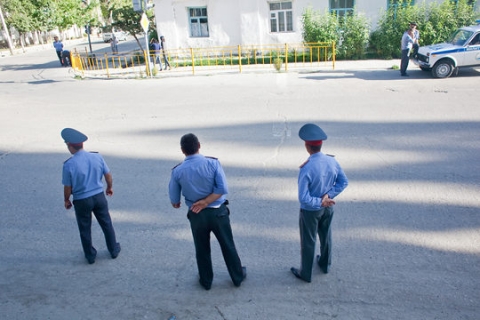Freedom from Torture
Civil Society Coalition against Torture and impunity in Tajikistan

Public monitoring of the local police activities was conducted in Tajikistan from 12 to 24 February 2013.
Overall 30 police departments and units of the Ministry of Internal Affairs in Dushanbe, Khatlon and Sughd, Gorno-Badakhshan Autonomous Region, and RRS were covered during the monitoring.
According to the information provided to NoTorture.Tj by the Director of the NGO “Independent Center for Human Rights Protection” Sergey Romanov, in the course of this campaign issues like public access to the police (access to the duty units, presence of ramps for the disabled), availability of information about the “helplines” or “hot line” of the law enforcement agencies, the rules of admission, registration and examination of applications, phone numbers of the departments’ authorities, schedule of the visitors reception, the availability of the complaints book, how the citizens being treated by the police staff and etc.
At the same time, monitoring allowed to assess the alertness of the police patrol units for the security of public order (availability of equipment, readiness to respond to the offense), the identification of patrol units (presence badges and IDs).
Among the positive findings it should be noted that there is a constant video surveillance at the entrances to the police units, also the staff of duty units politely treated both the public and civil society activists as well as provided information on the schedules of citizens reception by the Departments’ authorities, addresses and locations of the various services, including medical facilities. For example, in the Sughd region the staff of the duty unit was able to provide information on the official language (Tajik), in Russian, Uzbek and English languages, which is a positive example, given the possibility of the appealing of foreign nationals into the local police departments.
The monitoring showed that the buildings have an identification table “Militsiya”. However, the absence of special arrows indicating the location very often makes it difficult for the citizens to find the police departments.
At all police departments there are checkpoints installed to inspect and record each visitor. It was noted that this procedure creates difficulties and obstacles for the citizens for submit their statements.
None of the monitored police institutions entrance is equipped with ramps for the persons with disabilities, which hinders these citizens for filing applications to the duty units of police.
In Dushanbe, GBAO, RRS and Khatlon regions it was revealed that there is no information provided in the lobbies or at the entrance to the police building about the phone number or “hot line”. Moreover there was no information about the rules of citizens admission to the police offices. Only in Sughd region information on the “Hot Line” was available in almost all departments (except Kanibadam, Isfara and police department of rights bank of Khujand).
In all monitored police departments there is information about the dates of citizens’ reception by the authority of this institution. However, all monitored police stations lacked the complaint book, or as it was noted by the staff it is only available to officers on duty units and is not accessible to citizens.
While receiving the citizens the officers do not present themselves however are polite in communication. They provide all citizens with requested consultations and explanations. Some police officers in Sughd region wore badges with the name and position, and in the other regions were wearing regions metal tokens.
It should be noted that there is no separate room for the reception of citizens observed in the duty units of police.
As for the patrol service activities, the staff uniform in most cases corresponds to weather conditions on the day of monitoring. In Sughd it was noted that some staff members were wearing very light clothing. The uniforms lacked tokens and other identifying marks, except the markings related to service units of patrol service. Apart of whistles and rubber batons no other technical means were observed (eg, portable radio set).
The Patrol vehicles were registered in Dushanbe, Kulob and Kurgan-Tube, however the identification numbers on the plates did not allowed establishing which city and policing department they belong. Only the last digits on the plates indicate the region the cars are registered. However, in the Sughd region, it was noted that the patrol cars have identification numbers belonging to the local police departments (OMVD). It was also observed that the vehicles are used by traffic police.
According to Sergey Romanov, this campaign demonstrated that there is a need to display more information about the “hot lines” operating under the Interior Ministry in the local police departments, as well as to locate a stand with samples of complaints and statements, the information should be provided in other languages such as Russian and Uzbek, ensure access to the duty stations for persons with disabilities by building ramps and enabling other special conditions, ensure open access for the population to the complaint and suggestions books.
The Director of the Independent Center for Human Rights Protection expressed satisfaction about the public monitoring: “At present, we have provided the media with the preliminary results of our work. The results of the campaign will be reflected in the report, which is scheduled to be released in April 2013, together with our partners from the Russian Federation, Ukraine and Moldova”.